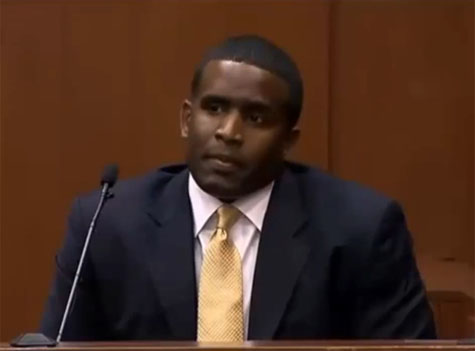Another prosecution witness seemed to backfire on the stand today when his testimony about self-defense on cross examination brought a chuckle from the courtroom and a rare smile from George Zimmerman.
Captain Alex Carter is a JAG officer who formerly taught criminal law at Seminole State College. George Zimmerman was one of his students, one of his best Carter said on cross examination. Wednesday Capt. Carter was called by the prosecutor to introduce evidence related to Zimmerman’s interest in law enforcement.
The direct questioning of Capt. Carter was fairly brief, around six minutes in all. However on cross examination Zimmerman’s attorney, Don West, spent a significant amount of time discussing the law of self defense. This led to a number of interesting exchanges including this one:
Don West: On the issue of injuries, when you would talk
about that with the class and your understanding of the law is that the
focus is what’s going on in the person’s mind, not whether they have
actually been injured. It’s the fear of the injury is it not?Capt.
Carter: It’s imminent injury or, excuse me, imminent fear. So the fact
alone that there is isn’t an injury…doesn’t necessarily mean that the
person did not have a reasonable apprehension of fear. The fact that
there were injuries have a tendency to show or support that that person
had a reasonable apprehension of fear. But the fact that there wasn’t an injury at all doesn’t necessarily mean there wasn’t a reasonable apprehension of fear.Don West: You don’t have to wait until you’re almost dead to defend yourself?
Capt. Carter: No, I would advise you probably don’t want to do that.
This was delivered deadpan and the understatement brought a hint of laughter from the courtroom as well as a brief chuckle from George Zimmerman.
As the cross examination of Capt. Carter proceeded, an attorney for the prosecution
repeatedly objected that Carter was only there to discuss his
class not the law in general. West stipulated that he was interested in
what Carter had taught in the class and then continued to ask questions like this:
Don West: So when you taught the class, what is the core concept of self-defense when you can use deadly force?
Capt. Carter: When you have a reasonable apprehension of death or grievous bodily harm.
Without being asked, Capt. Carter went on to describe the components of reasonable apprehension, a subjective believe that harm was imminent and an objective assessment–such as by a jury–that the belief was indeed reasonable. In other words, if the juror had been in the same situation as the defendant would they fear death or grievous bodily harm.
At one point Capt. Carter offered his own hypothetical situation involving self defense. Attorney Don West attempted to built on that and ask what it might mean if someone were calling for help but the attack did not stop. At this point the prosecutor objected again and Capt. Carter was not allowed to answer.
An earlier witness, John Good, has testified that he saw Zimmerman on his back calling for help while the person later identified as Trayvon Martin flailed his arms at his head in an apparent MMA-style “ground and pound.” Both families have claimed the cries for help belonged to their relative but Good, the only eyewitness to the fight besides Zimmerman, says the cries appeared to be coming from the person on his back. This account matches the story told by Zimmerman himself told police after the shooting.

COMMENTS
Please let us know if you're having issues with commenting.